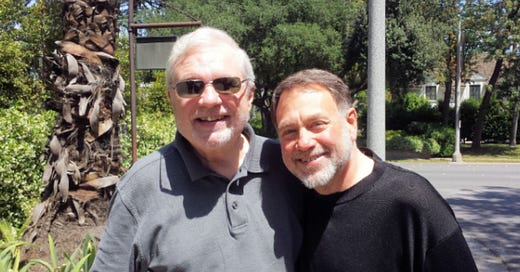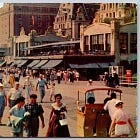Notes on Life and Love: Rounding Third Base
Growing old together, then older still, and what comes after.
This is the final part in a series of essays by Howard N. Fox.
Read the first essay in the series
The second essay is below:
Read essay three here:
Douglas and I have been together for just about 55 years now. As I explained previously, we met by chance in the spring of 1970, slept together, and have been together ever since. Some days—many days—our relationship has been the epitome of conjugal bliss, both psychological and physical. Many other days, it was a trench of dissonance and tension, both psychological and physical. Some days it was both. The disparities—none of them too unfamiliar to almost any couple in a long-term relationship—only served to confirm and strengthen our longevity as a couple.
I’ve been retired from my curatorial post at LACMA for about 14 years, although I’ve continued to organize exhibitions for non-profit art organizations and have continued to write extensive essays on contemporary art. Several years ago, I was invited by LACMA director Michael Govan to return as a guest curator, organizing a major show of Carlos Almaraz, a pioneering figure in the emergence of Chicanismo (the art, politics, and culture of Mexican Americans). I’ve enjoyed a truly stimulating and productive retirement.
Douglas, by contrast, has never considered himself retired or even slowing down for a single minute. If anything, he’s in a perpetual race against the clock, writing one or two—sometimes three!—critical essays in a single day. He keeps odd hours, going to bed around 6 p.m. and waking at midnight or so, when he immediately returns to his computer to resume whatever essay he’s completing or to launch a new one.
Today we’re both in our late 70s, dealing with all the welcome and unwelcome aspects of aging, everything from the visible graying of our hair and the wrinkles everywhere to the puzzling inner workings that come as surely as puberty did decades and decades ago. (I was the last in my gym class to get pubic hair, and I vividly remember praying fervently to God, in the days when I was still a believer, to grant me physical maturity—manhood. It finally happened.)
As for aging now, that has proved to be the other side of the algebraic equation: I never thought it would happen to me, but it is happening, right now. I comprehend what’s on the eventual horizon, and I’ve learned to expect it—and accept it—as surely as I longed for the growth spurt of adolescence. Yet it is, after all, the other end of the equation….
As a contemporary art curator, I once boycotted an exhibition (the only time that I ever did so) at the Natural History Museum of Los Angeles County featuring real human bodies dissected and preserved in a plastination process for public display—not as anatomical specimens, per se, but sliced up and reassembled and arrayed as aestheticized and exoticized poses. (So I later learned from newspaper accounts.) I’ve seen several dead bodies in open caskets, and I’ve seen too many pictures of miserably disfigured corpses in news photos over the decades. Seeing them doesn’t deeply unsettle me, nor do I look away. But I have no interest in seeing dead humans meticulously dissected, reconstructed, and rendered with weird peculiarity for what I deem as, essentially, showbiz. So I’m not allergic to the idea of death, of decay, of what happens after life exits the body.
Douglas and I decided about a decade ago to will our bodies to UCLA’s Medical School. There’s nothing too unusual about our bodies—a few surgeries between us including hip and knee replacements, gallbladder and prostate removals, blah, blah, blah—so we imagine that our carcasses will be cut up at UCLA and parceled out to various anatomy classes. But one day recently, while Douglas was busily writing at his computer, lunchtime neared and I intruded to say that I’d soon be serving our meal. He said he was writing so keenly and didn’t want to stop.
“You know, I’d be happy dropping dead right now,” he said, without irony. “Doing exactly what I’m doing now.”
”Well, even though we’ve already willed our bodies to UCLA,” I replied. “You’d probably prefer to be preserved in plastic and fixed at your keyboard forever and ever.”
Flashing a broad and bemused smile, he replied “Yes, I’d love that!”
He’ll never stop. That’s my hubby.
Douglas and I have lived a good—sometimes grand—life together, and we’ve been deeply devoted to and in love with each other, even during those days, or weeks, when we despised each other. And these days we want as much more of that love and devotion as life will afford us.
I don’t cry often, but when I do, it’s almost never about the sad or tragic aspects of life. Rather, when I cry, it’s like the way people cry at weddings: out of joy, good will, love. As I write the coda to this capsule history of Douglas’ and my life together, I’m all misty eyed. I’m crying, and happily so.










Congratulations ! You two are an inspiration to all of us